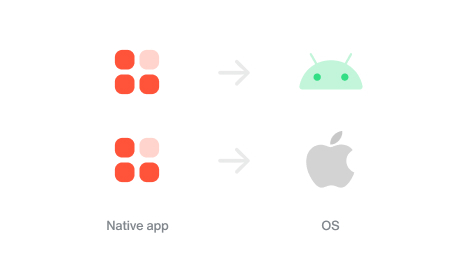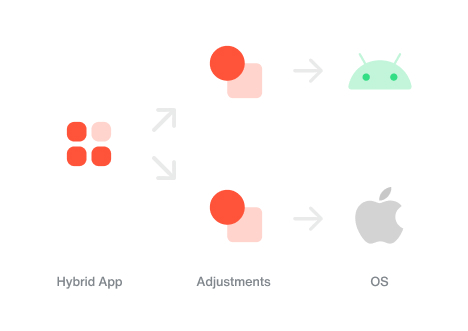Native or hybrid app, what should you choose for your mobile application?
Do you want to develop a mobile application? Do you know what type of app is best for your project? You must have heard about native applications and hybrid applications. Let's take a look at the differences between the two and how to choose the best solution for your application!

What is a native application?
Applications that are called native are designed and adapted to a particular OS. If you want your app to be available on iOS and Android, you will need two source codes specific to each operating system. The Kotlin language is used for Android apps and Swift for iOS.

👍 The advantages of developing a native app
The big strength of native apps is that they are simpler, smoother and more pleasant to navigate from the users' point of view. Indeed, the use of components directly provided by the platform manufacturers allows to have an application that respects the rules of design and UX that users are used to in a subconscious way. The native application also adapts more easily to OS evolutions that may concern features specific to each operating system (camera, swipe to go back, etc.) and support new features as soon as they are released (dark mode, widgets, etc.). Another strong argument on iOS, a single code base allows you to simply make your application available on iPhone, iPad and macOS.
👎 The weaknesses of native development for your app
The weak point may concern the startup cost of the project as well as the development time, due to the fact that you will have two applications to code if you decide to make it available on both Android and iOS. Generally, this cost is smoothed out on long-term projects due to the much easier maintenance on native applications. Depending on the size of your project and especially its simplicity (or complexity), it is possible that a native app is not the right choice and that a hybrid app is better suited.
What is a hybrid application?
As its name suggests, an application is said to be hybrid when the same source code is deployed on the different mobile operating systems. A single app is therefore coded but it is still possible to have adaptations specific to each OS, in terms of navigation for example. Hybrid applications can also contain native parts that will have to be developed on each OS separately.

👍 The positives of hybrid mobile apps
The main advantage of the hybrid app (depending on your project of course) is its speed of development. If your app doesn't require OS-specific adaptations, the same source code for both operating systems will be faster to develop than creating two native apps. Faster development means potentially lower costs.
👎 The negatives of the hybrid solution for your mobile app
Its main disadvantage: the fact that it is not adapted to each OS.
- Let's take the case where you just stick to the chosen framework (React Native, Ionic, Flutter, ...) to make your hybrid app, without adding code to call the phone features, specific to each OS. The user experience may be impacted, due to the lack of customization to each OS.
- The innovative character of your applications will be slowed down, indeed, it is not possible to use all the power of the hardware offered on smartphones or tablets, and very often, it is necessary to wait several months to be able to offer functionalities related to hardware and software evolutions of the operating systems.
- For applications that are, or end up being, complex, and that require adaptations for each OS, your code can quickly become complicated. As illustrated on the diagram above, the core of the app will be in React for example, but as your project becomes more complex, you end up having to add adaptations specific to iOS and specific to Android... You may end up having adapted your code so much on both sides for iOS and for Android, that two native apps would make more sense!
- Although the initial development cost of your applications is reduced, the maintenance cost is difficult to predict and can quickly become a financial drain, thus prejudicing the evolution of your project in the long run.
How to choose between a hybrid or native application?
Depending on your budget, your goals and the type of app you want to develop, it is important to make the right choice. Without knowing the details of your project, it is difficult to tell you which type of app will best suit your needs. However, we would be delighted to advise you and help you in your choice! Here are the main factors that will help you see things a little clearer:
- For very small budgets and uncomplicated projects, hybrid apps will be a better match. On the other hand, if you have a larger budget, it may be more interesting to use native applications.
- Your goal with your app is to offer a unique and quality experience to your customers, the native version will be your best choice!
- You don't need to make your app available on several OS, so it's not useful for you to develop a hybrid app.
- Also be careful about the complexity of your project, as hybrid versions may be too limited and may not allow you to develop your app the way you want.
Whether you choose to develop a native or a hybrid application, it is important to define your project and evaluate the compromises you are willing to make. Both types of apps have their strengths and weaknesses, so it's up to you to choose according to your needs.


